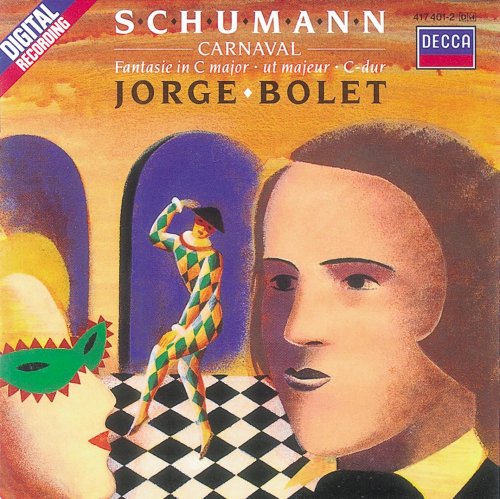
Jorge Bolet - Schumann: Carnaval & Fantasie (1987)
BAND/ARTIST: Jorge Bolet
- Title: Schumann: Carnaval & Fantasie
- Year Of Release: 1987
- Label: Decca
- Genre: Classical
- Quality: FLAC (tracks)
- Total Time: 1:05:21
- Total Size: 204 MB
- WebSite: Album Preview
Tracklist:
1. Carnaval, Op. 9: I. Préambule (02:32)
2. Carnaval, Op. 9: II. Pierrot (01:19)
3. Carnaval, Op. 9: III. Arlequin (01:20)
4. Carnaval, Op. 9: IV. Valse noble (01:44)
5. Carnaval, Op. 9: V. Eusebius (01:52)
6. Carnaval, Op. 9: VI. Florestan (01:03)
7. Carnaval, Op. 9: VII. Coquette (01:21)
8. Carnaval, Op. 9: VIII. Réplique - Sphinxes (01:02)
9. Carnaval, Op. 9: IX. Papillons (00:53)
10. Carnaval, Op. 9: X. A. S. C. H. -S. C. H. A. (Lettres dansantes) (01:14)
11. Carnaval, Op. 9: XI. Chiarina (01:26)
12. Carnaval, Op. 9: XII. Chopin (01:41)
13. Carnaval, Op. 9: XIII. Estrella (00:32)
14. Carnaval, Op. 9: XIV. Reconnaissance (02:07)
15. Carnaval, Op. 9: XV. Pantalon et Colombine (01:02)
16. Carnaval, Op. 9: XVIa. Valse Allemande (01:08)
17. Carnaval, Op. 9: XVIb. Intermezzo: Paganini (01:29)
18. Carnaval, Op. 9: XVII. Aveu (01:32)
19. Carnaval, Op. 9: XVIII. Promenade (02:29)
20. Carnaval, Op. 9: XIX. Pause (00:18)
21. Carnaval, Op. 9: XX. Marche des "Davidsbündler" contre les Philistins (04:03)
22. Fantasie in C, Op. 17: I. Durchaus fantastisch und leidenschaftlich vorzutragen - Im Legenden-Ton (13:02)
23. Fantasie in C, Op. 17: II. Mäßig. Durchaus energisch - Etwas langsamer - Vielbewegter (08:46)
24. Fantasie in C, Op. 17: III. Langsam getragen. Durchweg leise zu halten - Etwas bewegter (11:13)
1. Carnaval, Op. 9: I. Préambule (02:32)
2. Carnaval, Op. 9: II. Pierrot (01:19)
3. Carnaval, Op. 9: III. Arlequin (01:20)
4. Carnaval, Op. 9: IV. Valse noble (01:44)
5. Carnaval, Op. 9: V. Eusebius (01:52)
6. Carnaval, Op. 9: VI. Florestan (01:03)
7. Carnaval, Op. 9: VII. Coquette (01:21)
8. Carnaval, Op. 9: VIII. Réplique - Sphinxes (01:02)
9. Carnaval, Op. 9: IX. Papillons (00:53)
10. Carnaval, Op. 9: X. A. S. C. H. -S. C. H. A. (Lettres dansantes) (01:14)
11. Carnaval, Op. 9: XI. Chiarina (01:26)
12. Carnaval, Op. 9: XII. Chopin (01:41)
13. Carnaval, Op. 9: XIII. Estrella (00:32)
14. Carnaval, Op. 9: XIV. Reconnaissance (02:07)
15. Carnaval, Op. 9: XV. Pantalon et Colombine (01:02)
16. Carnaval, Op. 9: XVIa. Valse Allemande (01:08)
17. Carnaval, Op. 9: XVIb. Intermezzo: Paganini (01:29)
18. Carnaval, Op. 9: XVII. Aveu (01:32)
19. Carnaval, Op. 9: XVIII. Promenade (02:29)
20. Carnaval, Op. 9: XIX. Pause (00:18)
21. Carnaval, Op. 9: XX. Marche des "Davidsbündler" contre les Philistins (04:03)
22. Fantasie in C, Op. 17: I. Durchaus fantastisch und leidenschaftlich vorzutragen - Im Legenden-Ton (13:02)
23. Fantasie in C, Op. 17: II. Mäßig. Durchaus energisch - Etwas langsamer - Vielbewegter (08:46)
24. Fantasie in C, Op. 17: III. Langsam getragen. Durchweg leise zu halten - Etwas bewegter (11:13)
Virtuoso pianist Jorge Bolet began his keyboard studies at the age of nine. His progress excited his local teachers and he received a scholarship at the age of 12 to study in the United States, at the Curtis Institute of Music in Philadelphia. There his piano teacher was David Saperton. Beginning in 1932 he studied with Leopold Godowsky and Moritz Rosenthal, and, briefly, with Rudolf Serkin. He won the Naumburg Prize in 1937 and the Josef Hofmann Award in 1938. He became Rudolf Serkin's teaching assistant at the Curtis Institute in 1939. In 1942 he joined the United States armed forces. After the end of the war he was a part of the U.S. cccupying forces in Japan. There, he conducted the first performance in that country of Gilbert and Sullivan's The Mikado. He resumed his piano career after taking private lessons with Abram Chasins. Over a period of a few years he developed a reputation as a virtuoso player of astonishing power, able to play the most difficult works by Liszt with an impression of natural ease that left the feeling that there was no limit to his pianistic range. He became the head of the piano faculty at Curtis, and also was on the piano faculty of Indiana University at Bloomington. While in the United States he preferred the pronunciation "George" for his first name.
Until nearly the end of his life he maintained a major performing and recording career. His recordings were primarily for the Decca (London) company. He produced many estimable performances, notably those of the major piano works by Franz Liszt, as well as concertos and other works. As exciting as some of these recordings were, he was an artist whose full range of brilliance was not caught by the microphone. ~ Joseph Stevenson
Until nearly the end of his life he maintained a major performing and recording career. His recordings were primarily for the Decca (London) company. He produced many estimable performances, notably those of the major piano works by Franz Liszt, as well as concertos and other works. As exciting as some of these recordings were, he was an artist whose full range of brilliance was not caught by the microphone. ~ Joseph Stevenson
As a ISRA.CLOUD's PREMIUM member you will have the following benefits:
- Unlimited high speed downloads
- Download directly without waiting time
- Unlimited parallel downloads
- Support for download accelerators
- No advertising
- Resume broken downloads


